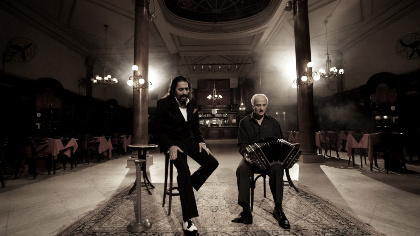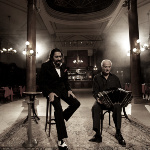- country:Spain
- region:Madrid
- style(s):Flamenco, Tango
- label:Cigala Music SL
- type:Band, Solo, Composer/Songwriter
- gender:male
- instrumentation:vocal
- artist posted by:La Bikina
Links
Ramon Jimenez Salazar is the name shown on El Cigala's passport. Diego's name is the result of a family dispute while at the baptismal font. El Cigala was a name given by the Losada btothers -and not by Camaron, as it is often said- during one of theirs first tours.
Diego was born in the cold month of December in 1968, on Provisiones street near the famous Madrilian fleet market "El Rastro". His mother, Aurora Salazar Motos, sister of the great musician Rafael Farina from the Spanish city of Salamanca, did not pursue a professional career as a singer but she touched those who listened to her flamenco echo. His Andalusian father, Jose de Cordoba, made a living at popular tablaos (flamenco clubs) such as Torres Bermejas, El Corral de la Pacheca and Arco de Cuchilleros.
Little Diego spent his time running after a football but whenever he would hear a singind, he would drop everything just to listen. Barely twelve years old, he won the Certamen Flamenco Joven de Getafe (a flamenco competition in Madrid for young singers) as well as an award in the Spanish TV show "Gente Joven".
Soon he started to sing for well known flamenco dancers such as Cristobal Reyes, Mario Maya, Manolete, Farrruco, Manuel Camacho and El Gueito, among others. Musicians such as Camaron, Tomatito, Gerardo Nunez and Vicente Amigo have relied on his collaboration for their recordings.
In 1997, he started his solo career with the album "Undebel", produced by David Amaya. This album featured guitars from Anton Jimenez, David Amaya, Paquete and Tomatito.
In 2000, his second album "Entre vareta y canasta" was released by 18 Chulos, a record label owned by the artists Wyoming, Santiago Segura, Faemino y Cansado, among others to name a few. It is particularly Wyoming who introduces El CIgala to Fernando Trueba (one prominent Spanish film director) who was interested in listening to the CD and ended up filming the videoclip of the single that titles the album.
A year later, he launches "Corren tiempos de alegria", with the collaboration of some of the jazz musicians who participated in the film "Calle 54" by Trueba. Among them, there were two artists who would mark his career: Bebo Valdes and Jerry Gonzalez. The album was nominated for the best flamenco album at the Latino Grammy's.
Along with Jerry Gonzalez, he recorded the album "Piratas del flamenco" and during that year, they both toured throughout Mexico and Spain with a breathtaking live show.
In 2002, El Cigala conquered on of the most coveted stages: the Teatro real in Madrid. The recordings of this concert, which included collaboration by Nino Josele, became a monumental flamenco manifest of this Madrilian singer.
When the film "Calle 54" was still being edited, Diego was blown away by the image of Bebo Valdes and Cachao playing Lagrimas Negras together and said he needed to meet that pianist and play with him. He began by singing "Amar y vivir" written by Consuelo Velasquez: "Por que no han de saber, que yo te amo vida mia..." (Why shouldn't they know that I love you, my darling?. This would become the first studio track that he would record with Bebo with appeared in the album "Tiempos de Alegria". I still remember the excitement that Sunday morning in which Bebo and Diego recorded together for the first time. "Everybody cried", Fernando Trueba commented. Both Diego and the Cigala felt this initial collaboration was just the begining and needed to take their musical encounter further.
Since the record label showed no interest, it was Fernando Trueba who became the missing link they needed to take their musical encounter further. Since the rcord label showed no interest, it was Fernando Trueba who became the missing link they needed to materialize the ideas that surged between that voice and that piano. In September, 2002, Bebo realises he does not have as much time as he wished he had, "you are both young; I am not".
Keeping it quite, the three of them put themselves to work and before the end of the year, Cigala and Valdesshowcased "Lagrimas Negras" at the Gusman Theatre in Miami. The next morning, the press described the pianist as "a living classic of the Cuban music" and the flamenco singer as the "Sinatra of flamenco".
In 2003, "Lagrimas Negras" went from an intimate, spontaneous project to an unstoppable boom that overcame the borders of flamenco and Latin music to be part of a record label preferred by hundres of thousands of families all over the world. The excellent criticism, the way these two geniuses defended their live shows and, above all, word of mouth, kept this album at the top of charts for the next two years.
The Ondas Award became the first of an immense pile of awards including remarkable ones such as Microfono de Oro, fiveAmigo Awards and five Latino Grammy nominations. Prior to this recognition, the New York Times harsh music critic, Ben Ratliff, had acknowledged this album 2003's Album of the Year.
In the middle of the never ending "Lagrimas Negras" tour, Diego recorded a collaboration of Paco de Lucia's album "Cositas Buenas" and "Suspiros de Espana", which became the main track of the film "Soldados de Salamina" by David Trueba.
In 2005, Diego decided to retum to flamenco paying homage to one of the greatest painters of all times, Pablo Ruiz Picasso. In this CD, musicians such as Paco de Lucia, Tomatito, Raimundo Amador, Josemi Carmona and Jerry Gonzalez contributed their sound to lyrics that range from the classic "Se equivoco la paloma" by Rafael Albeiti to other tunes by contemporary composers such as Javier Rubial, Javier Krahe or Carlos Chaouen. "Picasso in my eyes" became "Disco de Oro" in Spain and also in Venezuela.
In 2006 "Cigala" hit the shelves, a compilation of Diego's work in 5 CDs. He also shared the stage with Salif Keita, considered the golden voice of African
music, at the Biannual of Seville. The occasion only confirmed Diego's capacity to adapt his style to great traditional music.
That same year, Cigala became the new main attraction at the Latino Grammy's ceremony receiving the Best Flamenco Album award for "Picasso en mis ojos", as well the Best Videoclip award for "Blanco y Negro", directed by Fernando Trueba for the album "Lagrimas Negras".
Between trips, concerts, collaborations and the few hours he had left to play with his little ones Rafael and Diego, El Cigala found enough time to work on his new album "Dos Lagrimas". In this work, top Cuban and Spanish musicians reinterpret boleros, coplas and tangos as popular as "Dos Gardenias", "Marla de la O", "Historia de un amor" and "Compromiso". This album will be available at the record stores soon and has already been presented at extraordinary concerts like the one at the Patio del Conde Duque in Madrid, the one at Mar de Musicas Festival in Cartagena or the ones given in Colombia and Venezuela. Also in 2007, we listened to him in the main track of the film "Y tu, ?quien eres?" directed by Antonio Mercero, which focuses on the challenges that Alzheimer patients face.
While all these things happen, Diego's untameable mind dreams of new projects that he will undoubtedly turn into reality. 'I have to do an album with a symphonic orchestra. I close my eyes and I see myself surrounded by musicians and my guitarist right next to me', he assures.



